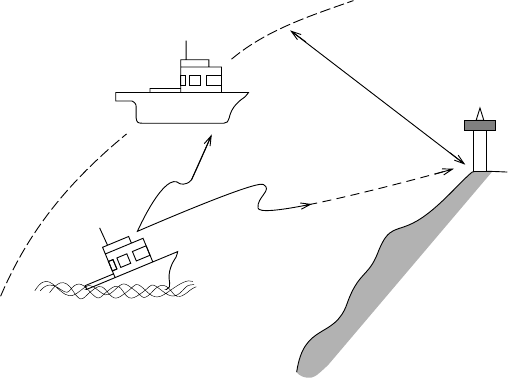
3-5
3.3 Receiving Distress Alert from Other Ship
In no case is a ship permitted to transmit a DSC distress relay
call on receipt of a DSC distress alert on VHF channel 70.
Conditions necessary for relaying distress alert:
1 When the station in distress is not itself in a position to transmit
the distress message, or
2 When the master or person responsible for the vessel not in
distress, or the person responsible for the coast station, consid-
ers that further help is necessary.
Procedure when in area A1
1. When the FM-8500 receives a distress alert from another ves-
sel the upper two LEDs (Red) near the [ALARM STOP] key
blink and the FM-8500 sounds the distress alarm.
2. Silence the alarm by pressing the [ALARM STOP] key.
3. Wait up to three minutes until the DIST ACK signal from a
coast station is received. Be prepared to follow the instructions
of the coast station.
4. If you do not receive the DIST ACK signal, follow the flow
chart shown on the next page.
If further DSC alerts are received from the same source and the
ship in distress is beyond doubt in the vicinity, a DSC
acknowledgement may, after consulation with an RCC or Coast
Station, be sent to terminate the call.
Note 1: An asterisk (*) in a received distress alert message indi-
cates error or unknown at the location marked with the asterisk.
Note 2: Do not send DISK ACK in response to receipt of distress
alert having a nature of distress of EPIRB emission.
About 20 to 30 miles
(Sea area A1)
Your Ship
Coast station
Distress Alert
Transmission
Vessel in Distress


















